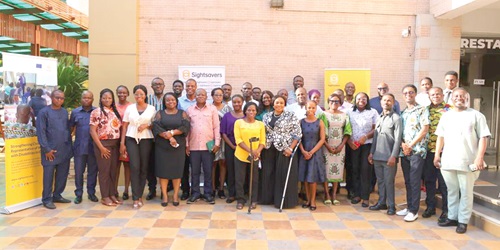
Govt urged to enforce compliance with laws on disability
The government has been urged to strictly enforce compliance with disability-related laws, including building codes and accessibility standards.
Also, the government has been tasked to sanction non-compliant organisations and government bodies, as many buildings and services remain inaccessible to people with disabilities.
A Disability Inclusion Advisor for the Ghana Regional Disability Organisations, Bismark Amoh, who made the call, further said public servants must be trained on how to appropriately engage PWDs to ensure a more inclusive society.
“What we should be doing is to activate our laws to start sanctioning non-compliant organisations or companies, and the government itself should start complying with what they have developed because a lot of government buildings are not accessible," he said.
Despite the numerous barriers faced by PWDs, he encouraged them to remain persistent in striving for the best. He acknowledged that a fully inclusive society may not be realised soon, but emphasised that they should not wait for all obstacles to be removed before taking action.
Training programme
Mr Amoh was speaking during a Disability Inclusion Training for Environmental Organisations organised by Sightsavers International Ghana, a non-governmental organisation in Accra.
The training was part of a component of a two-year EU-funded project dubbed “Strengthening Civil Society Representation of Women with Disabilities in Ghana”, being implemented by Sightsavers in partnership with Women with Disability Development and Advocacy Organisation (WODAO) and ABAK Foundation.
The project was aimed at creating a platform for collaboration with organisations, including environmental organisations, to advocate for positive change.
However, the training was aimed at enhancing the capacity of environmental organisations to include disability in their policies, plans and interventions.
Disability inclusion
The Programmes Manager for Sightsavers International Ghana, Samson Addo, called on institutions to take disability inclusion seriously to create a welcoming environment for all.
He emphasised the need for effective collaboration among civil society organisations, youth-led groups and state agencies in addressing the barriers faced by PWDs.
He said inadequate consideration of PWDs in disaster management and climate-change policies had been identified by the EU-funded project as a gap that needed to be addressed.
“The project aims to raise awareness and integrate disability issues into climate change mitigation and policy development, involving civil society organisations and national authorities such as the Environmental Protection Authority, Meteorological Service Department, and NADMO,” he said.
Barriers
A Senior Disability Inclusion Advisor at the Ghana Federation of Disability Organisations, Becky Nunoo, called on stakeholders to consciously and intentionally be inclusion-sensitive in all their actions towards PWDs.
She highlighted that barriers often stemmed from societal attitudes and communication issues, stressing the importance of accessible environments and effective communication methods for different disabilities.
She also highlighted accessibility as a key factor in ensuring PWDs could participate fully in society.
Ms Nunoo further called for appropriate methods of engagement to effectively communicate with visually, physically, and hearing-impaired individuals and foster inclusion and participation.
